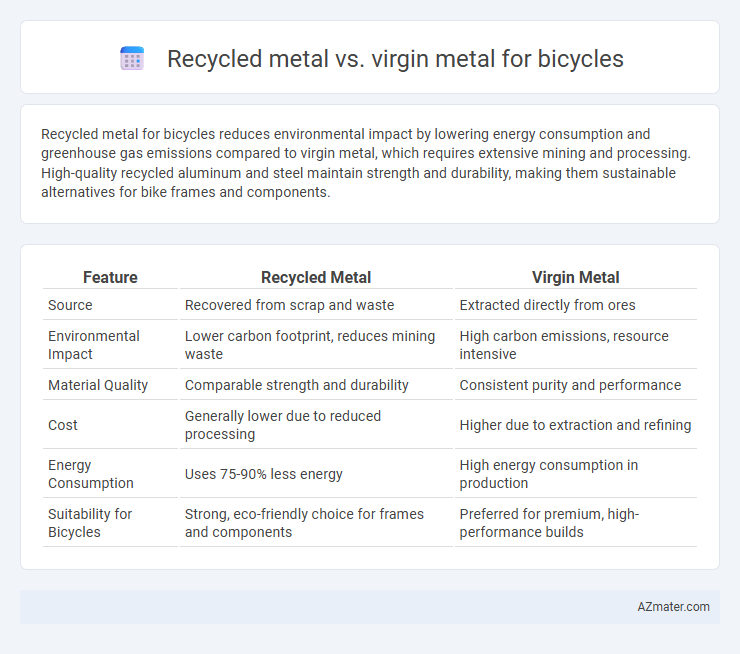Recycled metal for bicycles reduces environmental impact by lowering energy consumption and greenhouse gas emissions compared to virgin metal, which requires extensive mining and processing. High-quality recycled aluminum and steel maintain strength and durability, making them sustainable alternatives for bike frames and components.
Table of Comparison
| Feature | Recycled Metal | Virgin Metal |
|---|---|---|
| Source | Recovered from scrap and waste | Extracted directly from ores |
| Environmental Impact | Lower carbon footprint, reduces mining waste | High carbon emissions, resource intensive |
| Material Quality | Comparable strength and durability | Consistent purity and performance |
| Cost | Generally lower due to reduced processing | Higher due to extraction and refining |
| Energy Consumption | Uses 75-90% less energy | High energy consumption in production |
| Suitability for Bicycles | Strong, eco-friendly choice for frames and components | Preferred for premium, high-performance builds |
Introduction to Metal Choices in Bicycle Manufacturing
Recycled metal in bicycle manufacturing offers significant environmental benefits by reducing the demand for virgin ore extraction and lowering carbon emissions. Virgin metals provide consistent quality and mechanical properties essential for high-performance bike frames, often preferred in precision engineering. Selecting between recycled and virgin metals involves balancing sustainability goals with performance requirements and cost considerations.
Defining Recycled Metal and Virgin Metal
Recycled metal for bicycles consists of scrap metals recovered from discarded products, melted and reformed into new components, reducing environmental impact by conserving natural resources and energy. Virgin metal refers to raw metal extracted directly from ores through mining, processed without previous use, offering higher purity and consistent mechanical properties essential for high-performance bicycle parts. Understanding the distinction highlights the balance between sustainability with recycled metals and the strength or reliability ensured by virgin metals in bicycle manufacturing.
Environmental Impact: Recycled vs Virgin Metal
Recycled metal significantly reduces environmental impact by lowering energy consumption and greenhouse gas emissions compared to virgin metal extraction, which involves extensive mining and processing. Using recycled metal in bicycle manufacturing decreases landfill waste and conserves natural resources, contributing to sustainable production practices. The carbon footprint of recycled metal is up to 80% smaller than that of virgin metal, making it a critical choice for eco-friendly bicycle components.
Production Process Comparison
Recycled metal production for bicycles significantly reduces energy consumption by up to 95% compared to virgin metal extraction, which involves intensive mining and ore refining. The recycled process utilizes scrap metals melted in electric arc furnaces, minimizing carbon emissions and resource depletion. In contrast, virgin metal production requires extensive raw material processing, including smelting and chemical treatments, leading to higher environmental impact and longer production cycles.
Cost Analysis: Recycled vs Virgin Metal
Recycled metal significantly reduces production costs for bicycle manufacturing due to lower energy consumption and reduced raw material expenses compared to virgin metal. Virgin metal requires extensive mining and refining processes, leading to higher operational costs and environmental impact fees. Utilizing recycled metal enhances cost efficiency while maintaining quality standards, making it a financially advantageous choice in bike production.
Performance and Durability Differences
Recycled metal used in bicycles often matches virgin metal in strength and corrosion resistance, ensuring comparable performance during rides. Virgin metals typically exhibit more consistent structural integrity due to their uncontaminated composition, which can enhance long-term durability under extreme stress. Modern recycling techniques minimize impurities, allowing recycled metals to deliver reliable durability while reducing environmental impact without significant performance degradation.
Weight Considerations in Bicycle Frames
Recycled metal in bicycle frames offers a comparable weight to virgin metal while significantly reducing environmental impact through lower energy consumption during production. Advances in metallurgy have enabled recycled aluminum and steel to maintain strength-to-weight ratios essential for high-performance bikes. Weight considerations remain critical as recycled metals can be engineered to optimize frame stiffness and durability without compromising lightweight characteristics.
Availability and Supply Chain Factors
Recycled metal for bicycles offers increased availability by reducing dependency on raw material extraction, helping to stabilize supply chain fluctuations caused by mining disruptions or geopolitical tensions. Virgin metal supply chains often face longer lead times and higher costs due to resource scarcity and extraction processes, impacting production schedules and pricing. Utilizing recycled metals promotes a more resilient and sustainable supply chain by leveraging existing materials with lower environmental impact.
Industry Trends and Innovations
Recycled metal in bicycle manufacturing is gaining traction due to rising environmental regulations and consumer demand for sustainable products, leading to innovations in alloy refining and metal recovery technologies that enhance material performance. Industry trends highlight an increasing shift towards closed-loop recycling systems, reducing the carbon footprint compared to virgin metal extraction, which remains energy-intensive and resource-depleting. Manufacturers are integrating advanced sorting and remelting processes to maintain structural integrity and weight standards, driving competitive advantages in both cost efficiency and ecological impact.
Which Metal is Best for Bicycles?
Recycled metal and virgin metal both offer unique advantages for bicycle manufacturing, with recycled aluminum being popular due to its lower environmental impact and comparable strength-to-weight ratio. Virgin metals, such as high-grade aluminum alloys or titanium, provide superior durability, corrosion resistance, and performance for high-end bicycles. Choosing the best metal depends on the desired balance between sustainability, cost, and bike performance requirements.

Infographic: Recycled metal vs Virgin metal for Bicycle
 azmater.com
azmater.com